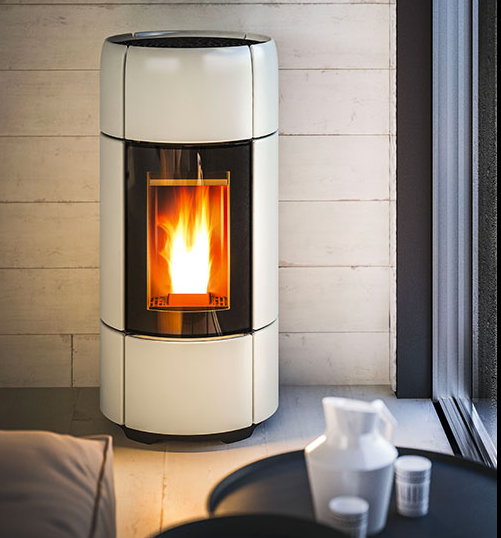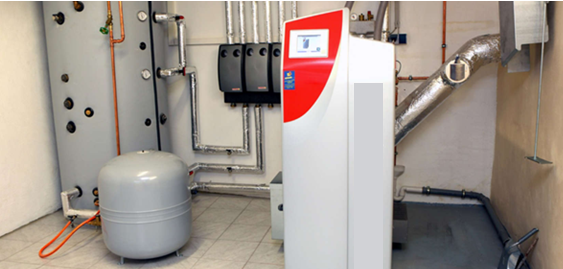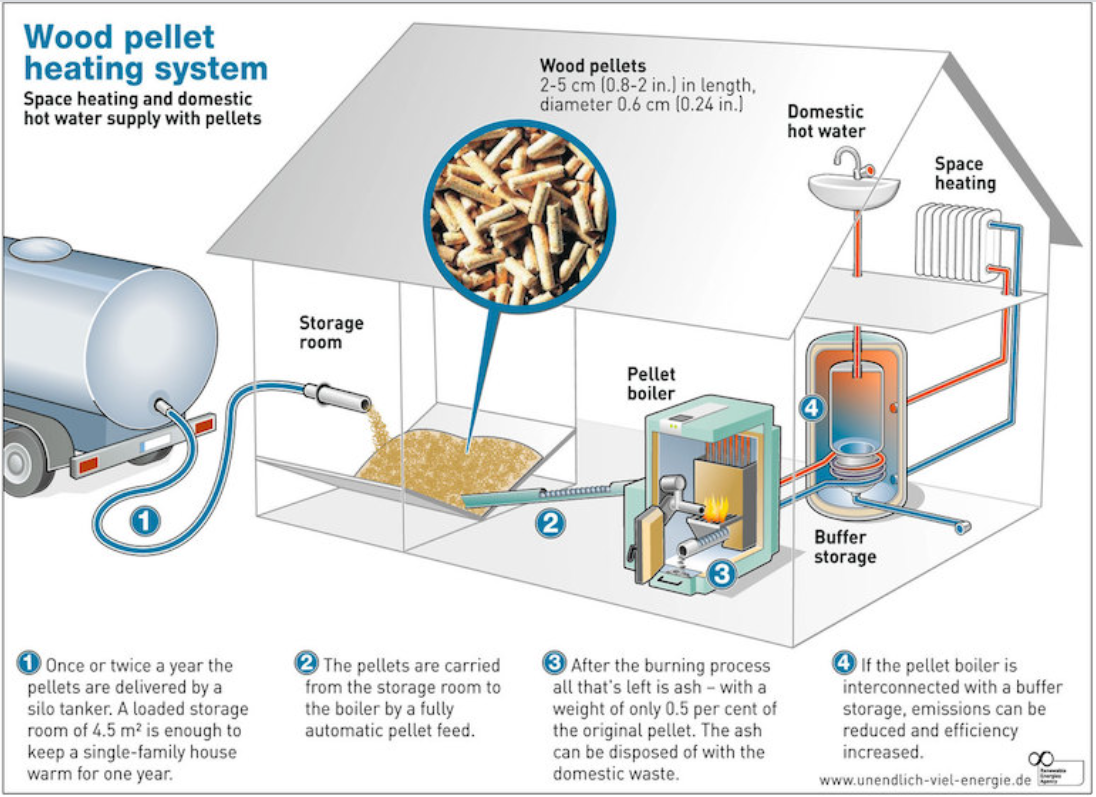Discover More
Pellet boilers
Energy Efficiency Week 2021 / Monday
Level 3: Get ready to move to renewable heating – pellet boilers
Modern pellet boilers are the ultimate convenience wood fuel appliance. While they are not going to be the right solution for everyone, they can be a good plug and play renewable alternative to an oil boiler.


If you have images of rolling up old newspapers and getting out the matches to get your boiler going then think again. Modern pellet systems have automatic fuel feed and ignition. They can be operated in much the same way as your standard oil or gas boiler with programmers and timers.
However, there are several differences that need some consideration in order to smooth the switch over of your home heating system.
|
Will you be getting ready to move on to renewable heating? |

1: Footprint / space requirements
Without doubt you are going to need a bit more space for a wood pellet system. The space requirements are often the main point for determining if a wood pellet system can be a practical renewable alternative in a home.
The boilers can be up to as much as 50% bigger than the oil boiler you might be replacing. If you are tight for space in the garage you may want to look at a system that can go outside or see if you have room for a self-contained shed.
In addition to the boiler, many systems work in conjunction with a buffer tank. This is a large store of water, sometimes as much as 500l or 1000l. The buffer tank allows the pellet system to operate at its most efficient. It will reduce the amount of fuel you use and reduce wear and tear on your boiler.
Last, and by no means least, is the space required for storing the pellet fuel. Oil is three times as dense as pellets when it comes to the energy it contains by bulk. If you want to store the same amount of energy you will need a store three times larger than your oil tank. However, you could just opt for more frequent deliveries.
The standard store size for a home in Ireland will hold 3.5 tonnes of pellets. This allows you to avail of bulk deliveries and brings down the fuel costs as opposed to buying bags of pellets. This size of store will generally mean one to two deliveries a year for most homes. There are lots of off the shelf solutions for pellet storage.
2: Ash removal
Unlike oil or gas, wood fuels produce ash which needs to be removed from the ash pan on average about once every three weeks. It’s also important to brush down or vacuum out the heat exchangers as ash builds up here too and will reduce the boiler efficiency if not removed. It is a simple DIY job but you can make it easier by ensuring access to the boiler is good and one of those ash hoovers can be handy. The ash can be put in the bin when it is cool. You can also compost it (if you have apple trees, they will love it).
3: Servicing
As with all boilers (fossil fuel or renewable) they will need regular servicing by an experienced engineer. If you want your boiler to operate safely, efficiently, and not break down just when you need it most then an annual service is just as important as it is for any other type of boiler.
When it comes to finding a pellet boiler engineer there are just fewer of them about, so it tends to cost a bit more and you need to plan ahead. It is well worth talking to your potential installers to see if they can also service your boiler.
4: Clean air zones
Although wood heating offers a renewable, lower-carbon alternative to fossil fuel-based systems, to ensure there is no trade-off between decarbonisation and air quality, policy support may increasingly require that wood heating systems limit air pollutants to acceptable levels.
Pellet boilers produce fine smoke particles and other air pollutants. Although they are significantly cleaner than burning solid fuel on open fires or in stoves, they still produce higher levels of particulate matter than gas fired alternatives. This mainly becomes an issue in urban areas where smoke control zones will mean that the boiler you install must be approved as an ‘exempt appliance’.
Using good quality wood pellets and regularly servicing your boiler will also help to keep emissions of air pollutants to a minimum.
5: Costs
There are running cost savings to be had compared to fossil fuels. Wood pellets are not as affected by the global markets as oil and gas are. According to SEAI 2020 wood pellets are circa 31% cheaper than oil per unit (kWh). Oil at 8.53 cents per kWh and Wood pellets (bulk delivery) at 5.94 cents per kWh.
Biomass boilers can cost anything from €2,000 to €20,000 depending on what you are looking for. They tend to be more expensive than the equivalent oil or gas boiler but the lower running cost will save you money over the lifetime of the system.
Grants for residential pellet systems are not available as an individual measure. However, grants for pellet burning stoves are available when included as part of a wider energy efficiency upgrade under the Community Energy Grant Scheme and the National Retrofit scheme (One -stop-shop development).
Will you be getting ready to move on to renewable heating?
Privacy Overview
| Cookie | Duration | Description |
|---|---|---|
| cookielawinfo-checbox-analytics | 11 months | This cookie is set by GDPR Cookie Consent plugin. The cookie is used to store the user consent for the cookies in the category "Analytics". |
| cookielawinfo-checbox-functional | 11 months | The cookie is set by GDPR cookie consent to record the user consent for the cookies in the category "Functional". |
| cookielawinfo-checbox-others | 11 months | This cookie is set by GDPR Cookie Consent plugin. The cookie is used to store the user consent for the cookies in the category "Other. |
| cookielawinfo-checkbox-necessary | 11 months | This cookie is set by GDPR Cookie Consent plugin. The cookies is used to store the user consent for the cookies in the category "Necessary". |
| cookielawinfo-checkbox-performance | 11 months | This cookie is set by GDPR Cookie Consent plugin. The cookie is used to store the user consent for the cookies in the category "Performance". |
| viewed_cookie_policy | 11 months | The cookie is set by the GDPR Cookie Consent plugin and is used to store whether or not user has consented to the use of cookies. It does not store any personal data. |




